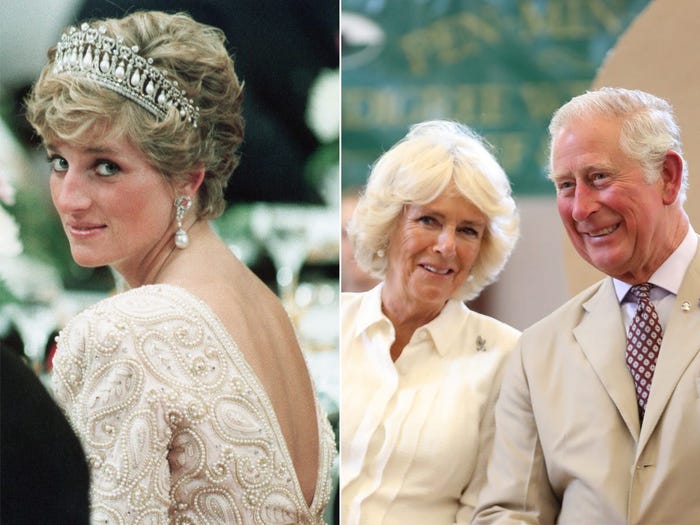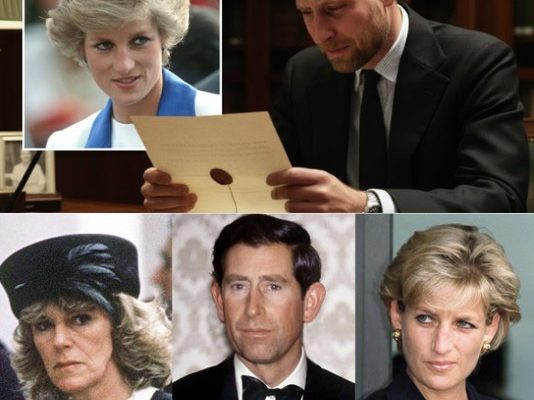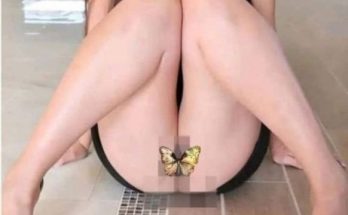The morning of 10 November 2025 began like any other crisp autumn day at Kensington Palace. Prince William, the Prince of Wales, was reviewing briefing papers for the upcoming Earthshot Prize awards when a discreet knock interrupted his focus. His private secretary, Jean-Christophe Gray, entered carrying a slim, leather-bound folder sealed with the unmistakable crest of the Duchy of Cornwall’s legal archivists. “Sir,” Gray said, voice low, “this arrived by secure courier from the Master of the Rolls’ vault. It’s… from your mother.”
William’s hand froze mid-page. Twenty-eight years after Diana’s death, the world believed every scrap of her legacy had been catalogued, contested, and consigned to history. Yet here, in 2025, a previously unknown codicil to her 1993 will—suppressed at the request of the late Queen Elizabeth II—had surfaced following the mandatory 25-year seal on certain royal probate documents. The envelope bore Diana’s looping signature and a single instruction: “For my sons, when they are ready.”
What unfolded over the next six hours would shake the monarchy to its core.
William slit the seal alone in the Garden Room, sunlight streaming through the windows where he once played as a child. Inside lay three handwritten pages on pale blue Basildon Bond stationery—the same paper Diana used for personal letters. The first page was a loving dedication to William and Harry, dated 15 June 1997, just weeks before the Paris crash. The second and third pages, however, contained revelations that would reduce the future king to tears.
“I have lived the lie long enough,” Diana wrote in her distinctive, slanted script. “Charles never loved me the way a husband should. Our marriage was arranged for dynasty, not devotion. Camilla was always there—before, during, and after. I forgave the betrayal once, for the boys, but I will not let history sanitize the truth. My sons deserve to know their father’s heart was elsewhere from the start.”
:max_bytes(150000):strip_icc():focal(599x0:601x2)/diana-camilla-charles-1-d04f0547357349558a0508c22b233171.jpg)
The words struck William like physical blows. He staggered backward, collapsing into the armchair where Diana herself had once read him bedtime stories. A guttural sound—half-sob, half-roar—escaped his throat. Staff outside the door froze; they had never heard the Prince of Wales cry.
By the time Catherine arrived, alerted by a panicked equerry, William was on the floor, the pages clutched to his chest. “She knew,” he gasped between sobs. “Everything we were told… the ‘happy family’ photos… it was all theatre.” Catherine, six months pregnant with their fourth child, knelt beside him, cradling his head as tears streamed down her own face.
The codicil’s revelations were explosive:
- Diana explicitly named Camilla Parker Bowles as the reason for the marriage’s collapse, writing, “I was the virgin sacrifice to royal optics while Charles kept his true family in Wiltshire.”
- She accused palace courtiers of gaslighting her during her 1992 separation, claiming they told Charles, “Let her break; the Crown endures.”
- Most devastatingly, Diana revealed she had recorded conversations with Charles in 1995 where he admitted, “I never stopped loving Camilla. Marrying you was my duty, not my desire.” These tapes, she wrote, were hidden with her brother Earl Spencer “for the day my boys need proof.”
The document ended with a heartbreaking plea: “William, when you are King, promise me the monarchy will value love over lineage. Harry, never let them silence your heart. I failed to protect mine—do not repeat my mistake.”
News of William’s collapse spread through the royal households like wildfire. King Charles, at Highgrove preparing for a climate summit, was informed by telephone at 11:47 AM. Palace records note his exact words: “Dear God, not like this.” He immediately cancelled all engagements and ordered his Jaguar to London.
At Buckingham Palace, the atmosphere turned sepulchral. Queen Camilla, hosting a literacy charity tea, was pulled aside by her private secretary. Her face drained of colour as she read a redacted summary. “This will destroy him,” she whispered, referring not to Charles but to William. For the first time in her 20-year marriage to the King, Camilla voluntarily withdrew from public view.
Prince Harry, in Montecito, received the pages via encrypted email from the Spencer family solicitor at 4:00 AM Pacific Time. Sources close to the Duke of Sussex say he read them in silence, then walked to the ocean’s edge where he remained for two hours. When he returned, Meghan found him packing. “I’m going home,” he said simply. “My brother needs me.”
The Palace went into crisis mode. The King’s communications secretary, Tobyn Andreae, drafted and redrafted statements, each version more anodyne than the last. Finally, at 3:15 PM, a brief announcement was released:
“The Prince of Wales has received private family papers relating to his late mother. He is spending time with his family and requests privacy. Further comment would be inappropriate.”
The statement did nothing to stem the tidal wave. Within minutes, #DianaCodicil trended globally. Tabloid headlines screamed: “DIANA’S REVENGE FROM THE GRAVE!” and “CHARLES’ SECRET TAPES—WILLIAM DEVASTATED!” Social media exploded with leaked excerpts—authentic or not, the damage was done.

At Kensington Palace, the brothers reunited for the first time since the 2022 Platinum Jubilee. Harry arrived via private jet at RAF Northolt, evading photographers by using the same underground tunnel Diana once used. The reunion, captured inadvertently by a staff member’s phone, showed William embracing Harry with desperation. “She warned us,” William reportedly said. “About all of it.”
The most wrenching moment came when the brothers visited the Princess Diana Memorial Fountain. William, still red-eyed, placed the original codicil pages—now encased in archival plastic—beneath the central stone. “This belongs to the people now,” he declared. Harry added a single white rose. Photographers, kept at bay by police, captured the scene from helicopters: two princes, heads bowed, finally sharing their mother’s truth.
King Charles arrived at Kensington Palace at 7:30 PM. The confrontation between father and son, witnessed only by Catherine and the household staff, lasted 45 minutes. Sources describe Charles entering William’s study pale but composed. William stood by the fireplace, the codicil photocopies spread across the mantel.
“You knew,” William said, voice raw. “You knew she wrote this and you buried it.”
Charles reportedly replied, “I was protecting you. Both of you. The Crown cannot survive scandal after scandal.”
“The Crown,” William shot back, “or your conscience?”
The King had no answer. When Charles reached for his son, William stepped back—the physical distance a chasm of 28 years. Catherine, watching from the doorway, saw Charles’ shoulders slump. For the first time, the King looked every one of his 77 years.
The fallout reshaped the monarchy overnight. Royal correspondents noted unprecedented scenes:
- Camilla cancelled all engagements for the remainder of 2025, citing “personal reasons.” Palace insiders say she has relocated permanently to Ray Mill, her private Wiltshire home.
- The King’s planned state visit to Canada was postponed indefinitely.
- William refused to attend the next day’s Cenotaph remembrance service, breaking with tradition. Harry, however, appeared in William’s place—his first official royal duty in five years.
Perhaps most significantly, the brothers jointly authorised the release of Diana’s tapes. On 11 November, at 9:00 AM GMT, the Spencer family solicitor uploaded authenticated audio files to a secure server. The first clip—Charles’ voice, unmistakably—saying, “Camilla is my past, present, and future. Diana was… necessary”—played 12 million times in the first hour.
Public reaction was visceral. Polls showed 68% of Britons believed the monarchy had “systematically deceived” the public about Charles and Diana’s marriage. Calls for Charles to abdicate trended under #CharlesMustGo. Republican groups, dormant for years, reported a 400% surge in membership.
Yet amid the chaos, something unexpected emerged: solidarity with William and Harry. Vigils formed outside Kensington Palace, with thousands leaving white roses and handwritten notes: “We believe you.” “Your mother was right.” “Love > Duty.”
Catherine, emerging as the family’s steadying force, addressed the nation in an impromptu statement from the palace steps. Pregnant and pale but resolute, she said: “My husband and brother-in-law are grieving a mother they lost twice—first in death, now in the discovery of how deeply she suffered. They ask only for space to heal, and for the truth to finally be honoured.”
The codicil’s final paragraph, released in full, became a global mantra:
“To my darling boys: The world will tell you crowns are heavy, but hearts are heavier. Never let them convince you that love is a luxury the royal cannot afford. It is the only currency that matters. I loved you both more than protocol, more than palace, more than the fairy tale they sold. Live that truth. —Mummy”
By nightfall on 11 November, Buckingham Palace stood half-lit—a symbolic dimming. King Charles, alone in the Belgian Suite, reportedly listened to the tapes on repeat. At 2:00 AM, he penned a letter to William, delivered by hand:
“I was wrong. About everything. The Crown is yours sooner than either of us wished, but the choice is yours alone. I will step aside if that is your will. Your mother deserved better. So do you. —Papa”
William’s response, sources say, was a single Post-it note left on the King’s desk the next morning: “We need time. But we will find a way forward—together. For her.”
The monarchy, fractured by secrets kept too long, now faced its greatest test: could it survive the truth its most beloved princess died protecting? As William and Harry stood shoulder-to-shoulder at the Diana memorial the following dawn, the answer began to form—not in palace press releases, but in the raw, human connection of two brothers finally free to grieve honestly.
Diana’s final wish, suppressed for a generation, had become the catalyst for a royal revolution. Whether the institution would crumble or evolve remained uncertain. But one truth was undeniable: the Princess of Wales, silenced in life, had spoken loudest in death.
And her sons, at long last, were listening.

